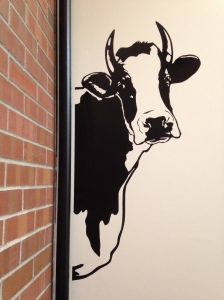By Taylor, Kenya and Spencer
For our Tutoring in Writing presentation, we decided to practice tutoring a student who brings in a paper that is mostly summary and lacks a true thesis. While deciding how to approach the assignment and what paper we could use as a sample to read aloud in class, we took a moment to look back at our own Encounters essays. When Taylor looked back through her Frankenstein essay, she realized that it had the exact problem we were focusing on – the essay lacked a formal thesis and was almost exclusively a summary of the text. This was perfect for us to use because it was a real, well-written essay that resembled something a student would actually submit.
Next we read through the paper together, as if we were in a COWS tutoring session. Taylor would make comments about her thought process while working on the paper, and at the same time Kenya was looking at the paper from the perspective of a tutor. We knew it was important to draw out parts of the essay that were interesting and could be developed further, potentially into a new thesis statement. It turned out that most of Taylor’s argument was shoved towards the end of the paper, when she had felt she was “allowed” to expand on her otherwise very basic thesis. This was interesting because it got us thinking about the different experiences students may have had in high school and even some college classes. Each teacher and professor wants something different, and students often feel that they need to follow a very specific set of rules while writing. We believe that this is a good thing for any tutor to keep in mind.
We also focused on the use of quotes in the paper. Instead of using the quotes to advance an argument, they were merely working to summarize the text. Taylor remembered adding the quotes because she knew she needed a certain minimum amount of evidence, rather than because she felt they were integral to her argument. This is a mistake a lot of freshmen make, so it was important for us to address it.
Spencer acted as an outside observer, commenting on and summarizing our (arguably very real) tutoring session. Sometimes it can be hard to recognize what sort of dynamics are present in a tutoring session while you are in the midst of it, so it was useful to hear the session summarized in a logistical way.
Our actual presentation consisted of a short reenactment of our original tutoring session, followed by Spencer’s explanatory synopsis. Part of the presentation involved reading the paper aloud, which revealed just how boring a summary-based essay can be, regardless of how well it is written. After the first few paragraphs, every time Taylor moved on to a new section, someone in the classroom would sigh in disappointment. It must have felt as if it would never end. While slightly embarrassing, the class’s reaction emphasized just how important an interesting, arguable thesis is to any good paper.
Overall, we felt that this assignment was an excellent learning experience because it allowed us to practice tutoring a very real situation that a COWS tutor is bound to encounter on a regular basis.
